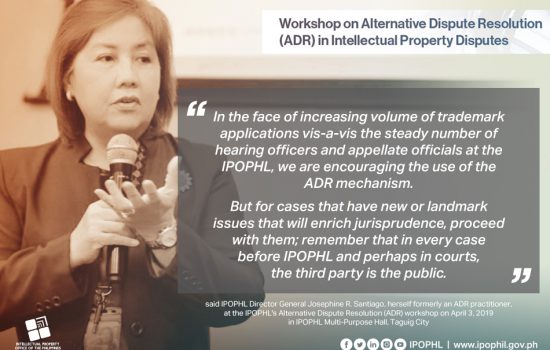IPOPHL: In IP disputes, balance mediation and pursuit of litigation

The Intellectual Property Office of the Philippines held the 4th run of its Alternative Dispute Resolution (ADR) workshop on April 3-4, promoting a balanced approach for IP lawyers to try mediation but also consider pursuing litigation in the name of enriching jurisprudence.
This message was delivered during the event, held as part of the celebration of April as National Intellectual Property Rights Month.
"In the face of increasing volume of trademark applications vis-a-vis the steady number of hearing officers and appellate officials at the IPOPHL, we are encouraging the use of the ADR mechanism,” said IPOPHL Director General Josephine R. Santiago, herself formerly an ADR practitioner.
Director General Santiago, however, made exception of cases that could enrich jurisprudence, such that the public interest may better be served if these cases are seen through litigation.
“But for cases that have new or landmark issues that will enrich jurisprudence, proceed with them; Remember that in every case before IPOPHL and perhaps in courts, the third party is the public,"she added.
Through its Bureau of Legal Affairs, IPOPHL championed ADR, specifically the mediation route in settling intellectual property disputes to more than 50 participants. This is because mediation, versus litigation, provides a more cost-effective and quicker way of resolving IP disputes. IPOPHL has been offering enhanced mediation services for IP disputes since February 2011.
This past October, IPOPHL enforced mandatory mediation to truly nudge parties to try a ‘gentle’ approach first in settling disputes, considering the cost implications & the prolonged process in the litigation route.
The process is quicker via mediation as parties negotiate personally , with a neutral mediator facilitating the bargaining through several sessions. Under IPOPHL’s rules, mediation period is allotted 90 days. If resolved, disputing parties stand to avoid costly litigation fees.
Pursuing IP disputes via litigation involves several procedures in determining the cause, discovery of issues, and presentation of evidence; with the appeals process, disputes may take years to resolve.
Apart from offering a quicker, less combative approach, enforcing this system may also help declog the case dockets of the courts and IPOPHL’s.
This mandatory mediation route compels parties to undergo that process, before they can opt to undergo litigation either in the courts or at IPOPHL (which is also a quasi-judicial body and also decides on cases).
In mediation both parties may have a chance to walk away with a mutual agreement on the IP case, in contrast to a litigation procedure wherein the adjudicating body rewards one party, at the disadvantage of the other.
The settlement agreement however, is subject to review and approval by the IPOPHL, to ensure that no pertinent law or regulation is violated. The review also helps in protecting public interest.
In 2018, filings for intellectual property violations and inter-partes cases (IPCs / cancellation cases), rose by 8 % and 7 % respectively.
Since enforcing the mandatory mediation system in October, the Alternative Dispute Resolution unit has received 70 cases.



